Hospitals, schools and transport shut down in Puerto Rico on May Day, as thousands marched to the financial center in San Juan to denounce cuts and privatizations expected under the government’s $123 billion bankruptcy filing May 3. The U.S. Congress created a new Chapter III bankruptcy law especially for Puerto Rico in its 2015-16 session. Unions and social movements say workers would pay the price in the largest bankruptcy filing in U.S. history, dwarfing even Detroit’s.
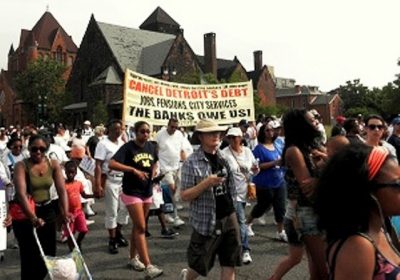
Many bankruptcy opponents demanded complete cancellation of Detroit’s debt to the banks, blaming them for the city’s crisis.
May 17, 2017–Federal U.S. Court proceedings on Puerto Rico’s $123 billion bankruptcy filing, likely to cause terrifying flashbacks for Detroit’s public workers and residents, began today.
In Detroit, public union leaders and others capitulated to a disastrous bankruptcy plan in 2014, which stole nearly all the city’s assets including its crown jewel, the $6 billion Detroit Water and Sewerage Department. The theft of DWSD led directly to the criminal lead poisoning for profit of the people of Flint. Chapter IX bankruptcy provisions forbids the takeover of a municipality’s assets “unless the municipality agrees.” U.S. District Court Judge Steven Rhodes recognized state-appointed Emergency Manager Kevyn Orr as “the city of Detroit.” Orr agreed to this wholesale rape of the largest Black majority city in the country.
The city’s debt rose 300 percent as the banks got paid under a state-enforced emergency manager. City workers, retirees, and residents took devastating cuts to their wages, health benefits, pensions and services.
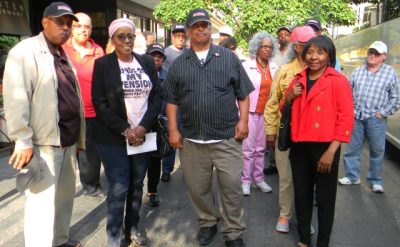
DAREA members disembark from bus in Cincinnati June 15, 2016 to pack 6th Circuit Court in support of their bankruptcy lawsuit. In center is DAREA President Bill Davis, to his right is DAREA VP Cecily McClellan. At far right is retiree Ezza Brandon. The case has now moved on to the U.S. Supreme Court.
Meanwhile, however, various independent coalitions of retirees, including the Detroit Active and Retired Employee Association (DAREA) have sued the federal government over the bankruptcy, and are currently awaiting a decision from the U.S. Supreme Court over whether they will hear the case.
But in Puerto Rico, which has a long history of struggles for independence from the U.S., a much more militant fightback began with a general strike May 1. The outcome of THESE proceedings will depend on the workers’ determination to fight for victory. Below are excerpts from articles in Bloomberg and Telesur on Puerto Rico’s battle.
Video above: Miller Buckfire was a key player in Detroit bankruptcy.
HEDGE FUNDS VIE WITH PUERTO RICO WORKERS OVER GETTING PAID FIRST
Commonwealth’s pension systems set to go broke this year
Island’s $123 billion bankruptcy biggest in municipal history
 By Michelle Kaske and Steven Church
By Michelle Kaske and Steven Church
May 12, 2017 5:00 AM EDT
The message in Puerto Rico is blunt: pay us, not Wall Street.
Anger over the biggest municipal bankruptcy in U.S. history has centered on the urgent question of public pensions. Puerto Rico has promised its workers and retirees $49 billion in benefits, but it’s guaranteed bondholders even more.
The pension system is scheduled to run out of money as soon as July, and many on the island fear, with benefit cuts already under discussion, that the hedge funds who own one-third of the commonwealth’s bonds will wrangle a better deal than ordinary Puerto Ricans.

U.S. District Court Judge Laura Taylor Swain
“The whole situation is unfair,” said Maria Rodriguez, a 64-year-old retired employee of the Public Building Administration. “I worked for over 35 years for the government and now it’s apparently clear that my pension will be cut by at least 10 percent. This is the result of the actions of multiple administrations from both parties.”
It’s a no-win situation for Puerto Rico and its 3.5 million people. Schools are being closed, talented residents are leaving and the economy has been contracting for years.
That’s the mess confronting U.S. District Judge Laura Taylor Swain as the adversaries face off for the first time in federal court May 17 in San Juan. They’ll be tussling over $123 billion owed to retirees and creditors.
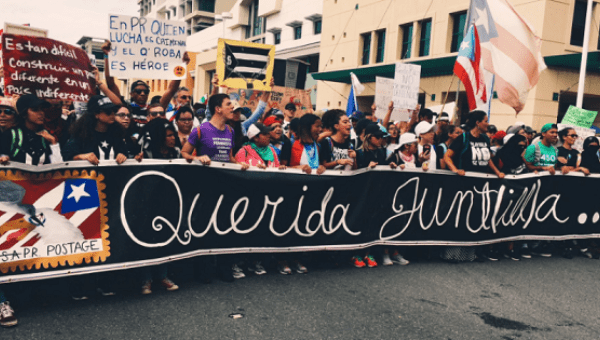
Massive May Day strike in Puerto Rico May 1, 2017. Black and white Puerto Rican flag is symbol of independence from U.S.
‘Don’t Care’
In pre-hearing rhetoric, labor groups are painting rich hedge funds as uncaring vultures looking to extract money from less-wealthy public workers. The creditors say there would be more money for everyone if Puerto Rico improved its revenue collections and thinned its hulking government bureaucracy.
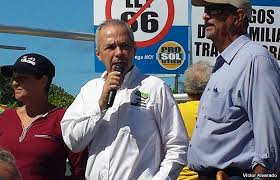
Emilio Nieves, Pres. of PR National Union of Educators and Education Workers
“Hedge funds don’t care what happens to the people, they want to get more profits,” said Emilio Nieves, president of Puerto Rico’s National Union of Educators and Education Workers. “They are our oppressors. We will resist and the government of Puerto Rico must decide if they are in favor of the people or the bondholders.”
Puerto Rico must decide if they are in favor of the people or the bondholders.
Average annual pension benefits are $14,000, according to Puerto Rico’s federal oversight board, and roughly one-third of employees are ineligible for Social Security benefits. Nearly half of island residents live in poverty and the median household income is $19,350, compared with $53,889 in the 50 states, according to U.S. Census data.
The commonwealth’s federal oversight board anticipates a 10 percent cut in pension expenses. That’s more generous than what Governor Ricardo Rossello offered bondholders in his latest public proposal. General-obligation bonds, or GOs, which the island’s constitution says must be repaid before other bills, would receive a best-case recovery of 90 cents on the dollar. Since that estimate depends on an improvement in the government’s finances, the recovery could be as low as 70 percent.
Divide Payments
Rossello’s fiscal plan would pay bondholders less than a quarter of what they’re owed in principal and interest through 2026. The government hasn’t said how they would divide those payments, or which group is first in line.
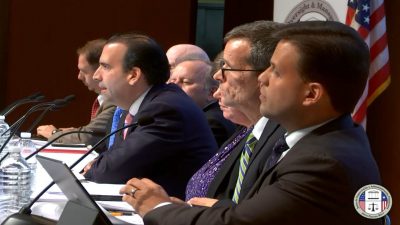
Puerto Rico’s “Federal Oversight Board” is appointed by the U.S. President. The City of Detroit and its new school district are similarly overseen by the State of Michigan.
“As much as there were promises made to various stakeholders on the island — pensioners, current government employees or contractors who work for the government — those are all implicit promises,” said David Tawil, president and co-founder of Maglan Capital LP in New York, who bought Puerto Rico bonds in 2013 but has since sold them. “The bondholders have explicit promises whether they be in offering documentation or whether they be pursuant to the constitution.”
The court hearing comes two weeks after Puerto Rico’s federal oversight board filed a form of bankruptcy called Title III to help reduce its $74 billion [now re-estimated at $123B] of debt and tackle its unfunded pension crisis. It will be the largest restructuring in the history of the $3.8 trillion municipal-bond market.
Title III, a provision in the Puerto Rico relief law that [the U.S.] Congress passed last year, is the only way for the island to force pension recipients to accept benefit cuts in court. Puerto Rico needed to pursue Title III in part because of its pension crisis, the board wrote in its May 3 filing. Another negotiating provision called Title VI didn’t include retirement savings. (To see bill passed by U.S. Congress without representation of Puerto Rican people, go to http://voiceofdetroit.net/wp-content/uploads/Puerto-Rico-HR-4199-bill.pdf.)
PUERTO RICO NATIONAL STRIKE PROTESTS ‘COLONIAL’ DEBT CRISIS
Nearly half the alleged $132B debt is interest to banks and hedge funds
More than $30B in debt issued illegally
Washington’s austerity prescription is hitting workers and students hard
6o percent of Puerto Rican children live in poverty; Detroit’s child poverty rate is 59 percent
TeleSUR
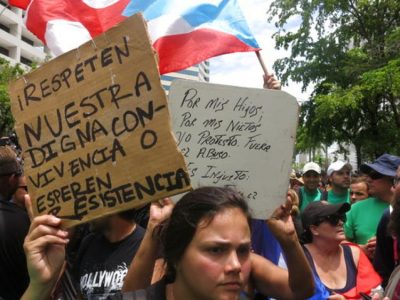
Puerto RIcans rise up against oppression by U.S. and banks.
May 1, 2017–Thousands of Puerto Rican workers, students and other demonstrators took to the streets in a national strike in the early hours of International Workers’ Day Monday to protest against the harsh austerity measures pummeling the island and the controversial federal control board managing its economy and crippling debt load.
RELATED: Puerto Rico Resistance Heats up as Major Cuts Target Education
The strike shut down businesses and blocked several streets, including traffic to the Luis Muñoz Marin international airport on the outskirts of the city as well as to the University of Puerto Rico, while dozens of others gathered at the offices of the Department of Labor in the capital’s Hato Rey area to prepare for a thousands-strong march on the financial district.
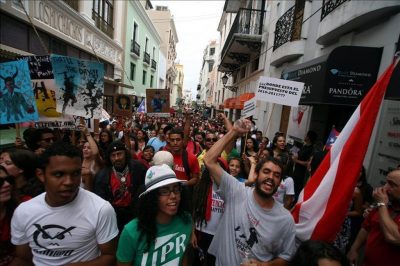
University of Puerto Rico students mass in streets.
Demonstrators carried signs with slogans against U.S. colonialism and against the neoliberal austerity measures targeting the island’s public education, health care, social security and other public services. Protesters chanted slogans including “Ricky is selling the island!” to criticize Governor Ricardo Rossello, while others marched with images of the Puerto Rico flag in black and white as a symbol of resistance amid crisis on the island.
Marches led by students, feminists, trade unionists and other groups began by congregating at five points in the city and later converged by late morning in the one-mile stretch of San Juan’s Ponce de Leon Avenue, known as the Golden Mile, where the controversial U.S. president-appointed fiscal control board steering the island’s economy is headquartered in the heart of the city’s financial center.
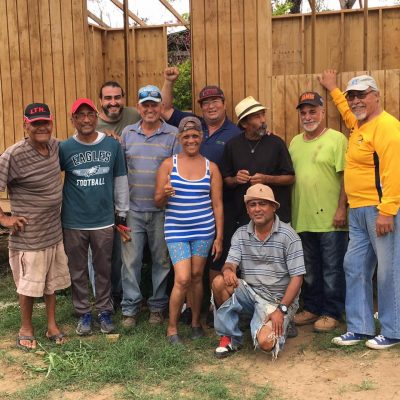
Juan Camacho at right with other Puerto Rican organizers
The fiscal control board — set up last year through the contentious PROMESA law that gained bipartisan support in the U.S. Congress as a plan to save Puerto Rico from its nearly US$73 billion debt crisis — has become a powerful symbol of the island’s colonial relationship with Washington and the sacrificing of basic rights in the name of servicing the island’s unmanageable debt load.
“This debt cannot be paid from the pocket of the workers,” community leader Juan Camacho said during the demonstrations.
RELATED: Puerto Rico Lays Groundwork for Upcoming Vote on Statehood
Puerto Rican artist Rene Perez, known as Residente, also joined the marches and addressed the demonstrators. Wearing a T-shirt promoting free public education, the famed rapper said he was proud to see the massive strike against the debt and in favor of workers’ and students’ rights.
“I’m very certain that is happening is completely unjust,” he said on stage to a large crowd, giving a shout out to students of the University of Puerto Rico, the island’s main public post-secondary education system with a total of 11 campuses and 70,000 students, and criticizing the hundreds of millions of dollars in cuts targeting the institution. “Education is fundamental for all countries’ development. That is what they are taking away from us and that’s what we have to defend until the end and that’s why we’re here.”
Protests against the cuts and the fiscal control board have argued that much of Puerto Rico’s debt is illegitimate. An initial audit report found that up to US$30 billion of Puerto Rico’s more than US$70 billion debt load was issued illegally.
A mind-boggling report by the ReFund America Project found that nearly half of the debt the island owes is not borrowed funds, but interest on bonds underwritten by Wall Street firms, who are raking in big profits from predatory lending schemes.
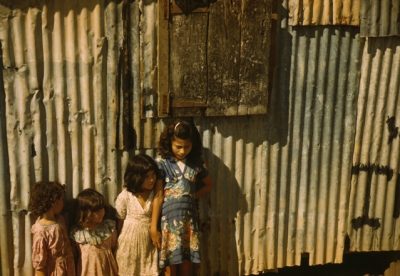
Puerto Rican children in housing settlement.
Nearly half of Puerto Rico’s population lives in poverty and child poverty is soaring at 60 percent. [Detroit’s child poverty rate is 59 percent.}The island faces a Medicaid funding gap of $650 million this year, while unemployment is nearly twice the average of the rate in U.S. states.
Puerto Rico’s ability to deal with its debt crisis has been crippled by the fact that it is a colony of the United States, which bars the island from filing for bankruptcy. Critics argue that the PROMESA bill and fiscal control board — which can override the local government in making decisions on the economy and debt restructuring — lays bare Puerto Rico’s lack of independence.
(For VOD’s dozens of stories on Detroit’s bankruptcy filing, put “bankruptcy” in VOD search engine at top right.)




